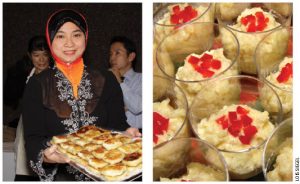
When the Department of Foreign Affairs and International Trade asked Ottawa’s foreign diplomatic community to help out by donating food to its second annual food fair, the diplomats responded enthusiastically.
Robert Peck, outgoing chief of protocol, explained that the idea was to create a lunchtime international buffet that would raise money to contribute to worthwhile causes in Ottawa.
“We know there are plenty of good international causes, but there are also people in need in Ottawa,” Peck said.
Menna Andrews, campaign leader for the Canada Workplace Government Charitable Campaign (CWGCC) at foreign affairs, echoed Mr. Peck’s sentiments.
“Often people from other countries think things are just fine in Ottawa, but it’s not true,” Ms Andrews said. “There are hidden poor in Ottawa.”
The food fair brought together staff from more than 50 embassies who made and presented food from their countries — often their national dishes. Some embassies made savoury offerings: the embassy of Japan, for example, brought large plates of hand-made sushi, while others, such as Venezuela, offered sweets.
Tickets for the fair cost $15 and sold out within two days. It was held in the main lobby of the Lester B. Pearson building and ended up raising $3,700 for the GWGCC. Money raised through this campaign is divided three ways — some goes to United Way agencies, some to health partners, such as the Canadian Cancer Society or the Alzheimer’s Society of Canada, and some to Centre-Aide de l’Outaouais agencies.
Besides raising money for worthwhile causes, the food fair is also a great opportunity for Canada’s foreign affairs officers to meet with their foreign diplomatic counterparts on an informal basis, Ms Andrews said.
“It brings us all together,” she said. “I’m sure the people from the embassies like to come to DFAIT and see some of the people they deal with, but on a different level.”
In addition to bringing the food, many of the embassies also donated door prizes, such as bottles of wine, books and artifacts from their countries. A total of 75 of the 200 people who bought tickets won door prizes. They were invited to donate them back to the campaign’s online auction, Ms Andrews said, and many did just that.





